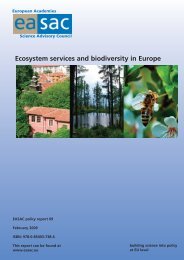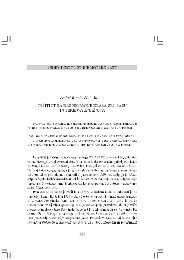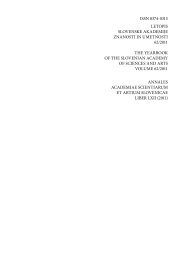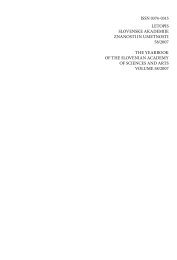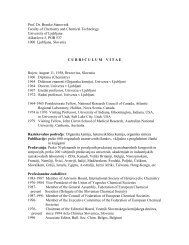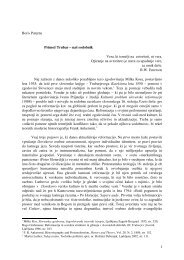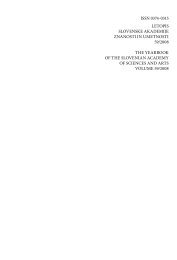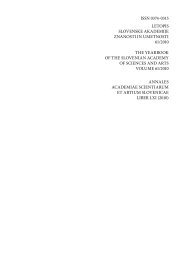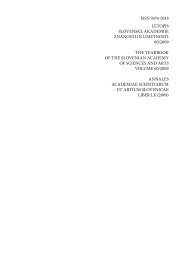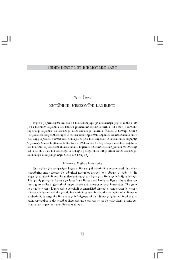Taking Inquiry-Based Science Education into Secondary ... - SAZU
Taking Inquiry-Based Science Education into Secondary ... - SAZU
Taking Inquiry-Based Science Education into Secondary ... - SAZU
Create successful ePaper yourself
Turn your PDF publications into a flip-book with our unique Google optimized e-Paper software.
18<br />
<strong>Taking</strong> IBSE <strong>into</strong> <strong>Secondary</strong> <strong>Education</strong><br />
When the results of test and examinations are used to set targets for teachers and schools this makes them<br />
‘high stakes’ for the teachers even though they may not have high stakes for the students. The higher the<br />
stakes – whether for students, teachers or both – the greater is the tendency to focus teaching on what<br />
is assessed to ensure maximum success. It is also the case that high stakes means that the reliability,<br />
or accuracy, of the assessment is emphasised in the interest of fairness. This leads to a preference for<br />
formal tests and examinations, especially the forms which are described as being more ‘objective’ than,<br />
say, methods based on judgments of teachers, even though these may provide a more complete picture<br />
of students’ attainment. Further, efforts to increase the reliability of a test mean that the sample of items<br />
included in a test will favour those items that can be most consistently marked – those requiring factual<br />
knowledge and using a closed format (multiple choice or short answer) – and the exclusion of those requiring<br />
application of knowledge and more open-ended tasks more suited to assessing understanding. Conversely,<br />
attempts to increase validity by widening the range of items, say by including more open-response items<br />
where more judgement is needed in marking, will generally mean that the reliability is reduced.<br />
As well as teaching to the tests high stakes testing leads to students spending time practising tests. The<br />
impact on students is to promote a view of learning as product rather than process 39 and is particularly<br />
de-motivating for lower-achieving students who are constantly faced with evidence of their failure. These<br />
impacts are more serious given the narrowness of what is tested. Defining what science education means<br />
in this way ‘is a great tragedy, inasmuch as it trivializes education for young people’ 40 .<br />
For these various reasons many current tests and examinations do not give valid information about progress<br />
and attainment in relation to the aims of IBSE. It is urgent that action is taken; otherwise the assessment<br />
regime will be a constant brake on attempts to implement IBSE in secondary schools.<br />
One course of action would be to replace at least some summative tests by moderated assessment by<br />
teachers. This has the advantage of ensuring alignment of the assessment with the curriculum aims,<br />
since teachers have access during teaching to information about the full range of skills, knowledge and<br />
understanding that are the goals of the inquiry-based curriculum. It has the further advantage of using data<br />
that teachers collect during teaching and which they can use to help learning, thus serving both formative<br />
and summative assessment purposes. However, implementing this course of action successfully would<br />
require extensive professional development, clarification of criteria and procedures for standardising and<br />
moderating teachers’ judgments. Although these processes all have benefits for practice, they are part of<br />
a longer-term solution. Meanwhile a more immediate course of action would be to improve the tests and<br />
examinations being used. As was pointed out by participants the instruments used in PISA surveys provide<br />
good examples of items that assess a range of inquiry skills, critical evaluation of evidence and the application,<br />
rather than the recall, of scientific ideas and principles. A further change could be made by requiring,<br />
as part of the examination, one or more extensive inquiries carried out by students during the school year.<br />
39 Harlen, W and Deakin Crick, R. 2003<br />
40 Alberts, B. 2009<br />
Report on the conference, York, UK, October 27-29 2010



